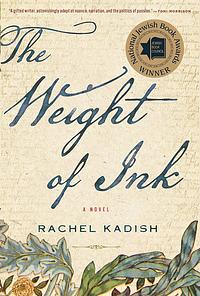Take a photo of a barcode or cover
slow-paced
Plot or Character Driven:
A mix
Strong character development:
Yes
Loveable characters:
Complicated
Diverse cast of characters:
Complicated
Flaws of characters a main focus:
Yes
The most thrilling scene in this book is when an academic purposefully sabotages a 400-year-old manuscript to prevent a rival from obtaining information. And I gasped. As a sometimes-heritage professional, I was scandalized; as a reader, I was hooting and hollering. This book was my Superbowl. I don't know sports. Anyway, if you enjoy academic sabotage and/or are interested in 17th-century Sephardic Jewish life in London, I cannot recommend The Weight of Ink highly enough.
My issue with dual-timeline historical fiction about people in the present discovering the past is that the present storyline serves as a vehicle for the past storyline. The present-timeline characters are almost always less engaging than the past-timeline characters, sometimes to the point of being unnecessary. They serve little purpose beyond being a mouthpiece for the past to speak through and a self-insert for the modern reader who may or may not be historically inclined.
Fortunately, this was not the case here. Rachel Kadish juggles three storylines—Helen and Aaron working with the manuscripts in 2000, Helen's time in Israel in the 1950s, and Ester's life in the 1660s—with no weak links. There were times during the Ester storyline (the most exciting section and the emotional core) when I wanted to go back to Helen and Aaron transcribing documents in the archives. It's just so thrilling!
Kadish's prose is richly textured, full of beauty and humour. We get fun little jabs between English Helen and American Aaron that feel like a reenactment of the War of 1812 (in chapter 11, Aaron "return[s] as though unexplained forty-minute breaks were one of those inalienable American rights," and in chapter 23, Aaron describes Helen as "so English her resting pulse is a negative number." The humour isn't limited to the present, and Kadish's 17th-century England (and 1950s Israel) isn't a stuffy academic recreation. See, for example, Chapter 18: "Even in Latin, [Ester]'d no patience for sentences that simpered like a bent neck," or Chapter 26, where Ester observes that Rivka "had been rehearsing for her own death since she'd first been cursed with survival. These lines are funny, at times darkly, but they reveal so much more about the characters than pithy epithets.
And the beauty of this book. I mentioned it before, but scrolling through my Kindle highlights, I realized how central the little beauties of life are to the novel, especially in Ester's story.
Early in Ester's story, "the ugliness of her life pooled inside her" (chapter 8), but by the end, we get this: "the comet's light existed for the mere purpose of shining. It hurtled because the cosmos demanded it to hurtle." We see Ester's appetite for life grow, just as the cosmos demands the comet hurtle from the desire for motion and beauty. She hungers for education and theological meaning, and she hungers for life. Even when her adopted city is destroyed by plague and fire, even when she fears for her life, Ester learns to live and love it well.
The only flaw in The Weight of Ink is that it takes too long to wrap up. I understand why Kadish needs to take her time concluding all her storylines, especially Ester's, but the emotions become too thin when stretched out this far. While it's a minor quibble in the grand scheme of things, it nonetheless harshed my vibe.
Anyway, if you love it when academics title articles like "So-and-So is a HACK and WRONG About (X) and Here's Why, With Footnotes," I can almost guarantee you'll love this book. Presidential alert: the academics are fightinggg!!!
challenging
reflective
medium-paced
Plot or Character Driven:
A mix
Strong character development:
Yes
Loveable characters:
Complicated
Diverse cast of characters:
No
Flaws of characters a main focus:
Complicated
hopeful
informative
reflective
sad
medium-paced
challenging
dark
informative
slow-paced
Plot or Character Driven:
Character
Strong character development:
No
Loveable characters:
No
Diverse cast of characters:
Yes
Flaws of characters a main focus:
No
I borrowed the physical book of The Weight of Ink from my city's public library. The summary intrigued me because I am a 3/4 Sephardic Jew (the other quarter is Romaniote Jew), and the plot's premise is about Sephardic Jews. I finished the book only because I was listening to the audiobook while reading the physical book.
I like reading historical fiction with dual plot lines, and I have a couple in the last few years. The Weight of Ink has multiple plot lines for our excessive number of main characters. Each story showed how the characters connect with some Jewish heritage or know someone with a Jewish legacy.
Yes, the book touched on subjects of theology doing injustices because the dogma has penetrated the society that women shouldn't learn theological and philosophical studies, especially during the 17th century when one of the plot lines takes place. Religions are always above others.
Rachel Kadish her novel takes the readers back in time, in 1660, before the great fire, before and during the plague of the 17th century (trigger warning if you can't read books set during a pandemic).
As I wrote above, I finished the book only while listening to the audiobook, even though the writing was dense because of the book's subject. The chapters were long; it felt like an eternity to read them; there were times I had to put the book down for a couple of days, read something else, and return to the book after a small break.
Although part of the characters is fictional, there are also real characters intertwined with the plot.
The truth is I didn't connect with any one of the characters. I felt that each one of the characters has their own agenda and they don't care what's happened around them, or to the people they live with or work with. There were times I felt mad at the stubbornness of Esther Velasquez. I felt sorry for the Rabbi Moshe HaCohen Mendes, both his prestigious student, are not acceptable to the Jewish community. One is Spinoza that was banned for the Jewish communities because of his philosophical & theological ideas. His second student is Esther, one of our many main characters. she is interested in learning, but she is a woman, and forbidden for her to be even close or holding those scriptures.
I wanted so much to love this book, because there aren't many Sephardic books talking about a very important part of the Jewish history.
I like reading historical fiction with dual plot lines, and I have a couple in the last few years. The Weight of Ink has multiple plot lines for our excessive number of main characters. Each story showed how the characters connect with some Jewish heritage or know someone with a Jewish legacy.
Yes, the book touched on subjects of theology doing injustices because the dogma has penetrated the society that women shouldn't learn theological and philosophical studies, especially during the 17th century when one of the plot lines takes place. Religions are always above others.
Rachel Kadish her novel takes the readers back in time, in 1660, before the great fire, before and during the plague of the 17th century (trigger warning if you can't read books set during a pandemic).
As I wrote above, I finished the book only while listening to the audiobook, even though the writing was dense because of the book's subject. The chapters were long; it felt like an eternity to read them; there were times I had to put the book down for a couple of days, read something else, and return to the book after a small break.
Although part of the characters is fictional, there are also real characters intertwined with the plot.
The truth is I didn't connect with any one of the characters. I felt that each one of the characters has their own agenda and they don't care what's happened around them, or to the people they live with or work with. There were times I felt mad at the stubbornness of Esther Velasquez. I felt sorry for the Rabbi Moshe HaCohen Mendes, both his prestigious student, are not acceptable to the Jewish community. One is Spinoza that was banned for the Jewish communities because of his philosophical & theological ideas. His second student is Esther, one of our many main characters. she is interested in learning, but she is a woman, and forbidden for her to be even close or holding those scriptures.
I wanted so much to love this book, because there aren't many Sephardic books talking about a very important part of the Jewish history.
I really wanted to enjoy The Weight of Ink. Split between the seventeenth century and the present day, the novel shows us the free-thinking but frustrated Ester Velasquez, and historians Helen Watt and Aaron Levy who centuries later stumble across Ester's writings and find in them material which could dramatically change contemporary understandings of Jewish women's history. Given some of the topics covered—a reassessment of history occasioned by paying attention to what women were actually doing; academic infighting and politics; the nitty gritty of doing history—I should have been entranced. I wasn't.
This is essentially the kind of book you pick up in the airport for an easy read on the plane ride to or from your holidays only it's got, as we say in Ireland, Notions. The characterisation is clichéd (I felt faintly offended on behalf of librarians/archivists throughout), as is the plot (with one "twist" near the end in particular that made me want to throw the book against a wall), the philosophical elements have all the heft of a first-year undergraduate's essay, and oh my god, that's not what archival research is like! We don't wear white gloves when working with paper! That's not how academic publishing works! Et cetera.
This is essentially the kind of book you pick up in the airport for an easy read on the plane ride to or from your holidays only it's got, as we say in Ireland, Notions. The characterisation is clichéd (I felt faintly offended on behalf of librarians/archivists throughout), as is the plot (with one "twist" near the end in particular that made me want to throw the book against a wall), the philosophical elements have all the heft of a first-year undergraduate's essay, and oh my god, that's not what archival research is like! We don't wear white gloves when working with paper! That's not how academic publishing works! Et cetera.
informative
reflective
sad
slow-paced
Plot or Character Driven:
Character
challenging
sad
tense
slow-paced
challenging
mysterious
reflective
slow-paced
Plot or Character Driven:
Character
Strong character development:
Yes
Loveable characters:
Yes
Diverse cast of characters:
No
Flaws of characters a main focus:
No
I am absolutely awestruck at the scope of this beautifully written and very engaging story of two academics researching documents uncovered during a home renovation. I think this may be one of the best books I have ever read and I very much recommend.
This is the kind of book you can't stop reading, but you don't want to end. Filled with richly drawn (and flawed) characters, the novel's story lines are heavily built around characters' encounters with their own flaws. The parallel stories -- four centuries apart -- were equally compelling, and the mystery of how each would end propelled me through. A fabulous read!





